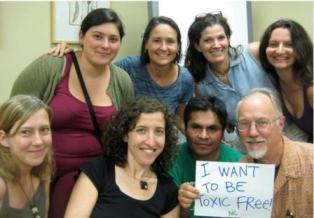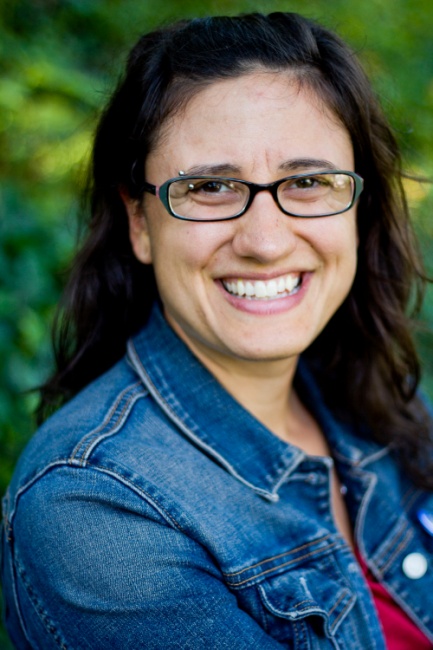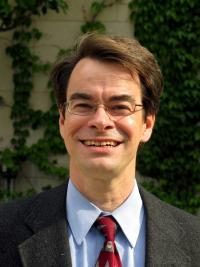[accordion-wrap][accordion title=”Organizational Development”]
 Meet ICL Executive Director Leadership Program Alumnae, Fawn Pattison
Meet ICL Executive Director Leadership Program Alumnae, Fawn Pattison
Toxic pesticides are used internationally. Executive Director Fawn Pattison has been with Toxic Free North Carolina since 2001. She came to Toxic Free NC as a community organizer, and her primary focus has been on reducing pesticide exposures for vulnerable populations, especially children.
Since 1986, Toxic Free North Carolina has been fighting pesticide pollution in North Carolina by advocating alternatives that protect personal health and the environment. They accomplish this through educating the community – examples being:
- The Toxic Free Kids Program which led to the creation of North Carolina’s School Children’s Health Act
- Presiding over legislation regarding government agencies that control pesticides versus sustainable practices in agriculture – visible through the Toxic Free NC Action Alert & Pesticide Policy Watch pages on their website
- Adapting the way people use harmful chemicals within the environment.
Fawn participated in ICL’s Executive Director Leadership Program in 2004. She was an inexperienced Executive Director with a staff of one, and growing dangerously close to burnout. “I was wearing a lot of different hats and somewhat overwhelmed. I was working long hours to try and deal with it all.” Participating in ICL’s Executive Director Leadership Program, Fawn observed new methodologies and gained insight to continue to work towards her organization’s mission.
“One of the takeaways for me was around organizational development,” she reflected. “There was this set of best practices that covered all the struggles with my board, how to do staff management and strategic planning, and how to build coalitions. These were issues that became part of my job responsibilities.”
Fawn also noted that another big takeaway was about self care.
“ICL’s program conveyed to me that a really important part of my job was not to wear myself out. The program provided tools for doing a better job of caring for myself, while staying fresh in my position.”
Fawn remarked that the importance of taking care of herself has had a significant impact on her work.
“I have been in this position for almost thirteen years now. I still get up and love doing it every day. I have two young children, and I’m enjoying my work. I think that is a direct result of being in ICL’s Executive Director Leadership Program.”
[/accordion][accordion title=”Passionate Leaders Doing Amazing Work”]
Meet ICL Executive Director Leadership Program Alumnae, Kelly Jo Drey
Kelly Jo was first introduced to ICL through an email from a colleague.
“At the time I was preparing to leave Upper Guyandotte Watershed Association, and trying to figure out how to set up my organization to manage this transition. I wasn’t the founder, but I had a lot invested personally and wanted to leave the organization in a good place to continue working toward our mission. I was worrying about how to be a good supervisor and effectively motivate my colleagues, and I didn’t have a lot of experience in a leadership role.”
In 2007, Kelly Jo enrolled in ICL’s Leading from Within program, where she gained the skills she needed to feel more confident about her situation.
“It was the whole idea of observing your reactions, and trying to understand how that affects your actions as a leader. You learn there’s an emotional aspect that drives us to do certain things. Since then I’ve had more exposure to that in different areas of my life.”
Peter Lane, ICL’s Director of Program Services and instructor of Leading from Within, has seen the program benefit numerous individuals over the past 10 years.
“Every group is different, but each one is full of passionate leaders doing amazing work. They come together with a strong spirit of learning and support their peers with such generosity. I always look forward to seeing how they apply what they’ve learned in the program at their own organizations. Again and again, I hear from alumni that they’re more self-confident in their leadership, act from a place of intentionality, and feel more equipped to take on the challenges of a complex world.”
Kelly Jo is now Director of the Sustainability Institute at Bridgemont Community and Technical College in West Virginia. The Sustainability Institute works to connect educational institutions, economic development and government agencies, non-profits, and regional business leaders to address economic, health, social, and environmental benefits for workers, students, and the greater community.
“Even after almost six years, I continue to draw insights from what I learned through Leading from Within. It taught me to change my perspective and take different approaches in my day-to-day work.”
[/accordion][accordion title=”Leadership For Long-Term Change”]
Meet ICL Executive Director Leadership Program Alumnae, Kevin Brubaker
“I have hanging on my wall, to this day, the 1991 graduate certificate from ICL,” says Kevin Brubaker, executive director of the Environmental Law and Policy Center. “The program provided an opportunity to step outside the day to day advocacy world and think more about nonprofit management and a whole set of tools that encompasses. That has served me well in the two decades since then.”
As Kevin reflects on his career as an environmental leader, he points to ICL’s guidance as a key factor of his success. Under his leadership, the Environmental Law and Policy Center “has mastered these tools” and grew from a staff of 3 to a staff of 45 with seven offices spread around the region. An advocate himself, Kevin is widely recognized as a leading expert in high-speed rail, and through years of efforts he is celebrating a major victory: President Obama’s dedicated of $2 billion to support a Midwest high speed rail network. But, Kevin recognizes that that it’s not enough to just be a successful advocate.
“ICL plays a unique, distinctive and important role in building the sustainable advocacy community our world needs.”
[/accordion][accordion title=”Honoring Land and Values in Wyoming”]
Meet ICL Executive Director Leadership Program Alumnae, Laurie Milford
Wyoming Outdoor Council has a long history as a conservationist, having co-founded the Student Environmental Coalition at the University of Iowa as an undergraduate. Laurie has 17 years of experience working in the nonprofit and education sectors, including a stint at Westview Press, then a scholarly subsidiary of HarperCollins.
She was development director at the Wyoming Outdoor Council when she was tapped for the top job. To enhance her skills, she signed up for ICL’s Executive Director Leadership Program.
“Wyoming ranks second in gas reserves nationally, and first in coal and uranium,” Laurie says. “Half of the state is public land, and more than half of that is already leased for energy exploration.” In spite of providing so much of the nation’s energy, the Wyoming Outdoor Council has been able to lead successful conservation efforts in Wyoming because it honors the traditions of Wyoming, recognizing that energy development is a core part of the economy but also that residents want to achieve balance in the state.”
Laurie says ICL helped her become a better listener and better able to understand deeply all constituencies involved in addressing an issue. “We are careful to talk about conservation as a universally held value and as a bipartisan issue. People in Wyoming share this value because they have a land ethic; they grew up spending a lot of time in the outdoors,” says Laurie.
Laurie and her staff helped lead a broad coalition to advocate for land preservation-hundreds of people including local citizens who use the forest, hunters and anglers, ranchers, the tourism industry, elected officials, and regional and national conservationists. The effort culminated in 2009 when President Obama signed the historic Wyoming Range Legacy Act into law, which set aside 1.2 million acres of the Bridger-Teton National Forest from future oil and gas drilling.
“ICL is a great resource for conservation leaders. The program helped me become a stronger leader, it gave me the framework I needed to be an effective chief executive.”
[/accordion][accordion title=”ICL Leadership Training Spans Advocacy Movements”]
Meet ICL Executive Director Leadership Program Alumnae, Mehrdad Azemun
Mehrdad Azemun, Field Director, encountered ICL in the first week of his professional life in the early 1990’s as an organizer for National Wildlife Federation’s campus program, ‘Campus Ecology’
“I hold ICL responsible for a lot of my growth as a leader,” says Mehrdad. “The skills I’ve come away with have paid direct dividends inside the environmental movement, and since then paid dividends in the immigrant rights movement.”
Then, as a young executive director of the small grassroots organization, the Chicago Recycling Coalition, Mehrdad had passion for his work but needed to learn about how to run an organization. “I was absolutely a spring chicken,” says Mehrdad. “In the ICL Executive Director Leadership Program I learned the hard skills that helped keep the organization effective, as well as the importance of self care.”
The ICL staff modeled a collaborative style that stayed with Mehrdad, and he has continued to use that style in organizing and developing other leaders. The way the program was designed with an initial training, coaching, action planning, and peer support enabled him to apply what he was learning directly in his organization.
Today, as field director for Reform Immigration for America Campaign, Mehrdad sees young leaders in the same position he was in – many of them deeply frustrated and ready to walk away. “It was a reflection of myself when I was younger, only the difference was someone had invested in me,” says Mehrdad. “And, that organization was ICL.”
“In the book about the civil rights movement called I’ve Got the Light of Freedom, there is a chapter named “Slow and Respectful Work” – about what it takes to really build trust and build a leader. That is how I think of ICL’s work. None of this is fast, none can be taken for granted. It is thoughtful, deliberative work. There is a reason I can’t point to one campaign or piece of legislation that ICL has affected – it is actually many pieces of legislation and many beautiful, ecologically important places that ICL has helped preserve indirectly. These things happen because ICL has done that thoughtful, slow, deliberative work with so many leaders and so many organizations.”
[/accordion][accordion title=”Leadership for Change that Never Gives Up”]
Change can happen
According to Kim Leval, executive director of Northwest Coalition for Alternatives to Pesticides (NCAP). “You have to be persistent, you have to be tenacious, and you can never stop.” She has seen first-hand how building relationships over the long-term can lead to major wins for the environment.
Previously, at the Center for Rural Affairs, Kim participated in a meeting convened by ICL to bring together a national group of crop, soil and agronomy scientists to meet with the sustainable agriculture community. The scientific associations had faced growing influence from corporate perspectives, with strong actors such as Monsanto and Cargill. “By bringing the scientists together with the sustainable agriculture community, ICL created and strengthened an important democratic counter-balance to the voice of corporations,” says Kim. The dialogue sparked a whole new line of research and inquiry. “Ten years ago, most USDA research was focused on what kind of pesticide killed what kind of bug,” recalls Kim. “By bringing organic farmers into the dialogue and seeking alternatives, it made a big difference. Now, there is a national organic research program at USDA.”
Fast forward to Kim’s work today, and she is continuing her advocacy for alternatives to pesticides in the top leadership role at NCAP. Attending ICL’s Executive Director Leadership Program was her board’s idea to ensure a smooth transition after the retirement of a 24-year long leader. Being able to reach out to other directors in the network, ask for advice, and gain insights from the ongoing coaching were invaluable to her in her first year at the helm. That year happened to be when the economic crisis hit. Her ICL coach helped her understand that the board would be looking to her for leadership. “ICL’s approach helped me strengthen my confidence and remember to trust my best instincts,” said Kim.
“ICL makes leaders more effective. That translates into more change for the environment.”
[/accordion][accordion title=”Sustainability Toward Impact”]
 Toxic Free North Carolina is celebrating its 25th anniversary next year
Toxic Free North Carolina is celebrating its 25th anniversary next year
It marks major progress in reducing toxic chemicals that affect the Earth and community health. Fawn Pattison came to ICL’s Executive Director Leadership Program when she was in her twenties and was three years into her tenure as executive director. With so many different things competing for her attention, ICL helped Fawn gain a road map and an action plan to put it all into perspective. Toxic Free North Carolina
“I stopped burning the midnight oil after that — ICL emphasizes self-care. I realized that not burning myself out was part of my job responsibility,” reflects Fawn. “So, here I am still, nine and a half years later – that is a really good endorsement for the program! I still really love this work and this organization.”
When Fawn became executive director nine years ago, the organization was seriously affected by the recession that followed September 11th. Fawn worked through those difficulties and was determined to build the organization for long-term sustainability.
“I knew I was supposed to call people and ask them for money, but it really terrified me,” admits Fawn. She received a grant from the Environmental Support Center to create a fundraising plan, and she went to ICL’s Complete Fundraiser program to help her implement it.
“I believe very strongly because we had a plan in place and because we had built our skills on staff and board, we have had more resilience through this recession — vastly more than we had in the last recession,” says Fawn. “Economically, it’s so much worse, but surviving it, we came into it in a much better place.”
 Now, Toxic Free North Carolina has some major wins under its belt: years of advocacy led to a new law requiring schools to reduce their toxic chemicals through integrated pest management plans. And, they are working with local farmers to protect the health of farm workers and expand organic farming.
Now, Toxic Free North Carolina has some major wins under its belt: years of advocacy led to a new law requiring schools to reduce their toxic chemicals through integrated pest management plans. And, they are working with local farmers to protect the health of farm workers and expand organic farming.
Clearly, Fawn and her team will have much to celebrate at their 25th anniversary next year!
[/accordion][/accordion-wrap]





